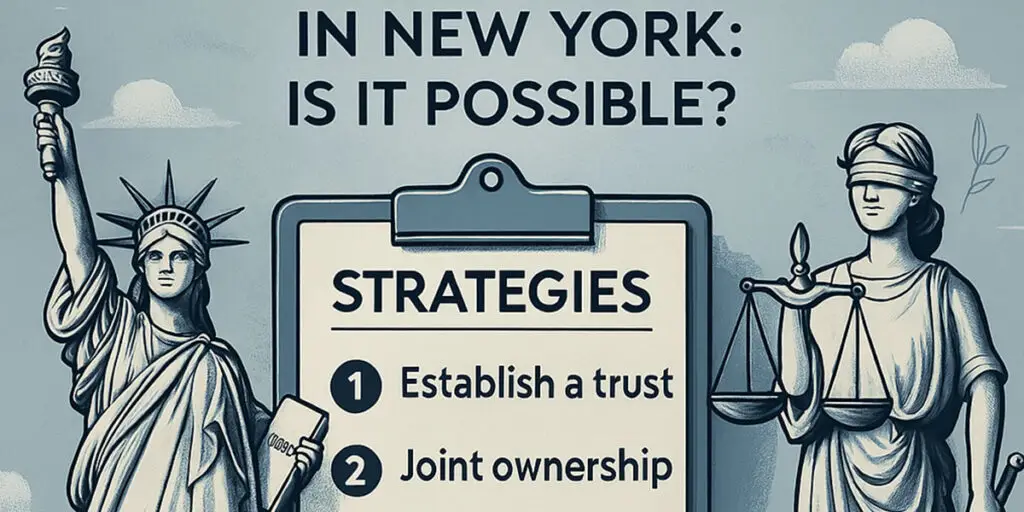Avoiding Probate in New York: Is It Possible?
Probate, the legal process of administering a deceased person’s estate, can be time-consuming, costly, and stressful for loved ones. Many New York residents understandably seek ways to avoid probate and streamline the transfer of their assets to their beneficiaries. But is it truly possible to completely avoid probate in New York? The answer is nuanced. While completely eliminating probate can be challenging, there are several effective strategies that can significantly reduce the amount of assets subject to probate or even bypass the process altogether. Careful estate planning with a skilled attorney is key to finding a strategy that works for you.
This comprehensive guide will explore the various probate avoidance strategies available in New York, explaining their benefits, drawbacks, and suitability for different individuals and families. We’ll discuss the use of trusts, joint ownership, beneficiary designations, and other techniques to minimize or eliminate the need for probate. We’ll also address common misconceptions about probate and provide actionable advice for creating an estate plan that protects your assets and simplifies the transfer of wealth to your loved ones. At Morgan Legal Group, we can help you create a streamlined plan, schedule a consultation with our team today!
Understanding the New York Probate Process (and Why You Might Want to Avoid It)
To effectively explore probate avoidance strategies, it’s essential to first understand the New York probate process and why so many individuals seek to avoid it. Probate is the legal process of administering a deceased person’s estate, as described above. The basic steps include:
- **Filing the Will with the Surrogate’s Court:** The original will must be filed with the Surrogate’s Court in the county where the deceased person resided.
- **Notifying Interested Parties:** All heirs and beneficiaries must be notified of the probate proceeding.
- **Appointing an Executor or Administrator:** The court will appoint an executor (if there is a will) or an administrator (if there is no will) to administer the estate.
- **Identifying and Valuing Assets:** The executor or administrator must identify and value all of the deceased person’s assets.
- **Paying Debts and Taxes:** The executor or administrator must pay all of the deceased person’s debts and taxes.
- **Distributing Assets to Beneficiaries:** The executor or administrator must distribute the remaining assets to the beneficiaries in accordance with the terms of the will or the laws of intestacy.
While probate is a necessary process for ensuring that estates are administered properly, it can be costly and time-consuming. Probate fees, attorney fees, and other expenses can reduce the amount of wealth that is ultimately transferred to your heirs. The probate process can take several months or even years to complete, especially if there are disputes among family members or challenges to the validity of the will. Avoiding these issues can help you avoid the stress that these issues may create.
Moreover, probate records are public documents, meaning that anyone can access information about your assets and beneficiaries. For individuals who value privacy, avoiding probate can be an important goal. For example, it is crucial to ensure all sensitive financial areas are kept private and away from those who are not included. By exploring probate avoidance strategies, you can protect your family from unnecessary stress, expenses, and delays, and ensure that your assets are transferred to your loved ones in a private and efficient manner.
Strategies for Avoiding Probate in New York
Fortunately, there are several effective strategies for avoiding or minimizing probate in New York. These strategies involve careful planning and the use of various legal tools to transfer assets outside of the probate process.
Revocable Living Trusts
One of the most common and effective methods for avoiding probate is to create a revocable living trust. A revocable living trust is a trust that you create during your lifetime and that you can modify or revoke at any time. You transfer ownership of your assets to the trust, but you retain control over the assets as the trustee. During your lifetime, you can use the assets in the trust as you see fit. After your death, the assets in the trust will be distributed to your beneficiaries according to the terms of the trust, without going through probate. This is a great path to ensure you have everything covered with the team at Morgan Legal Group for Trusts and Wills.
Revocable living trusts offer several advantages over wills. In addition to avoiding probate, they can also provide for the management of your assets if you become incapacitated during your lifetime. They can also be used to protect assets from creditors and to provide for family members with special needs. To ensure this is the path you want to go down, ensure you consult with an experienced lawyer.
Joint Ownership with Rights of Survivorship
Another common method for avoiding probate is to own assets jointly with another person with rights of survivorship. This means that when one owner dies, the surviving owner automatically inherits the asset, without going through probate. Joint ownership is often used for real estate, bank accounts, and other assets. Keep in mind that although straightforward, it is important that you account for all details of asset administration. Make sure the correct owner is listed.
While joint ownership can be a simple and effective way to avoid probate, it’s important to consider the potential drawbacks. Joint ownership can expose your assets to the creditors of the other owner, and it can create complications if the joint owners disagree about how to manage the assets. It’s also important to consider the tax implications of joint ownership.
Beneficiary Designations
Assets that have a designated beneficiary, such as life insurance policies, retirement accounts (401(k)s, IRAs), and transfer-on-death (TOD) accounts, typically pass directly to the beneficiary without going through probate. It’s important to review your beneficiary designations regularly to ensure that they are up-to-date and reflect your current wishes. It is crucial to ensure you are consistently staying on track!
It’s also important to name contingent beneficiaries in case your primary beneficiary predeceases you. If you fail to name a contingent beneficiary, the assets may have to go through probate.
Gifting Strategies
Gifting assets during your lifetime can be another effective way to reduce the size of your estate and avoid probate. Under federal law, you can give away a certain amount of assets each year without incurring gift tax. By gifting assets to your loved ones during your lifetime, you can reduce the amount of assets that will be subject to probate after your death. However, it is important to fully understand the process of federal taxes to ensure that you don’t face penalties for any mistakes. It is best to consult with an expert.
When gifting assets, it’s important to consider the potential tax implications for both you and the recipient. You should also be careful not to give away so many assets that you jeopardize your own financial security. Consulting a financial advisor and estate planning attorney will assist you in ensuring this task is appropriately achieved.
Small Estate Administration
New York offers a simplified probate process called “small estate administration” for estates that are below a certain value. The threshold for small estate administration changes from time to time, so you’ll need to check the current law to determine if your estate qualifies. Small estate administration is less complex and time-consuming than regular probate, and it can be a good option for smaller estates.
To qualify for small estate administration, you must file a petition with the Surrogate’s Court and provide documentation to support your claim that the estate is below the threshold. The court will then appoint a voluntary administrator to administer the estate. The voluntary administrator has the same responsibilities as an executor or administrator in a regular probate proceeding, but the process is generally simpler and faster.
Common Misconceptions About Probate
There are many common misconceptions about probate that can lead to confusion and anxiety. It’s important to understand the facts about probate so that you can make informed decisions about your estate plan.
“Probate is Only for the Wealthy.”
This is a common misconception. Probate is required for estates of all sizes, not just wealthy estates. Even if you don’t have a lot of assets, probate may still be necessary to transfer ownership of those assets to your heirs.
“Probate is Always Expensive.”
While probate can involve expenses, it’s not always as expensive as people fear. The costs of probate depend on the size and complexity of the estate. In some cases, the costs of avoiding probate may be higher than the costs of going through probate.
“Probate is Always Time-Consuming.”
The length of the probate process depends on the complexity of the estate and any disputes that may arise. While some probate proceedings can take several months or even years to complete, others can be completed in a matter of weeks.
“I Can Avoid Probate Simply by Having a Will.”
A will is an essential component of an estate plan, but it doesn’t avoid probate. A will must be validated by the Surrogate’s Court through the probate process. To avoid probate, you need to use other strategies, such as trusts, joint ownership, or beneficiary designations.
Creating an Effective Estate Plan: Working with a Probate Attorney
Avoiding probate requires careful planning and a thorough understanding of New York estate law. Working with an experienced probate attorney can provide valuable benefits. To make the process easier, our expert team at Morgan Legal Group is fully ready to assist you with these key tasks:
- Assessing Your Assets and Liabilities.
- Understanding Your Family Circumstances.
- Helping You Reach Your Objectives.
- Custom Solutions.
Expert Guidance and Personalized Solutions
A probate attorney can provide expert guidance on all aspects of probate avoidance. They can assess your specific situation, identify potential issues, and develop customized solutions that meet your needs. They can also explain the legal implications of different strategies and help you make informed decisions.
Ensuring Legal Compliance
An estate planning attorney can ensure that your estate plan complies with all applicable laws and procedures. Probate laws are complex and vary from state to state. An attorney can help you avoid common mistakes that can invalidate your will or trust or result in legal challenges. To ensure all legal codes are maintained properly, reach out to Morgan Legal Group Today!
Minimizing Taxes and Maximizing Wealth Transfer
A good estate planning attorney can help you minimize estate taxes and maximize the amount of wealth that is transferred to your heirs. They can identify tax-saving strategies and implement them effectively. They can also help you navigate the complexities of federal and New York State estate tax laws.
Providing Peace of Mind
Perhaps the greatest benefit of working with an estate planning attorney is the peace of mind it provides. Knowing that you have a well-crafted estate plan in place can alleviate stress and anxiety about the future. You can rest assured that your assets will be protected, your loved ones will be taken care of, and your wishes will be honored.
Taking the Next Step: Contact Morgan Legal Group Today
Avoiding probate in New York is possible with careful planning and the use of appropriate legal tools. While completely eliminating probate may not be feasible in every situation, there are several effective strategies that can significantly reduce the amount of assets subject to probate or bypass the process altogether. By working with an experienced probate attorney, you can create an estate plan that protects your assets, simplifies the transfer of wealth to your loved ones, and provides peace of mind for the future. It is so important to get this right for your circumstance, as this is a sensitive matter. At Morgan Legal Group, we are here to assist you with this process! We are ready to assist residents in the following locations Long Island, and NYC. Reach out to some of the other locations that we provide assistance
To reach our group in Brooklyn, the Bronx, and Queens
Check us out in these additional areas: Staten Island, Westchester, Albany, Suffolk County, Ulster County, and Orange County.
Check us out: sample Reach out and Book Appointment Services
The NY Courts have additional resources for you.









